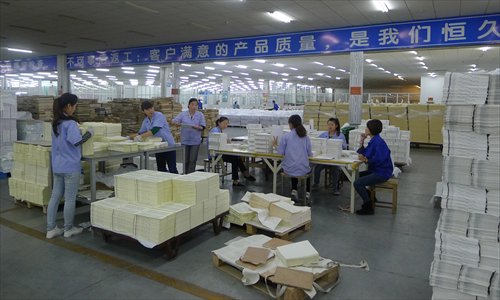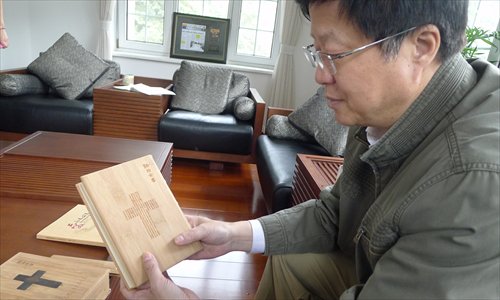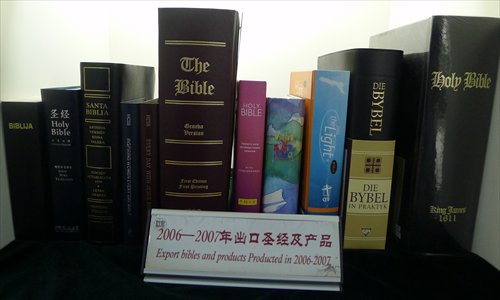The Bible business

Workers put together Bibles at a production room of the Amity Priniting Company. Photo: Liu Dong/GT
When 18-year-old Liu Lei got his first job at a Sino-foreign joint venture printing factory in Nanjing 27 years ago, he never thought that one day he would be at the helm of the world's largest Bible manufacturer and a global business network.
Graduating from school in 1986, Liu started as a worker in Nanjing Amity Printing Press. Today, he is the general manager of the world's largest monomer Bible printing factory, which employs more than 600 workers, produces 12 million Bibles in more than 90 languages annually and sells them to 70 countries and regions worldwide.
Although Liu is an atheist, he tells his son, who has interned at the factory, that his job is to print a great book that has deeply influenced Western culture and values and is now affecting a growing number of people in China today.
According to official figures, China had more than 25 million Protestants and 6 million Catholics by 2012, and this doesn't even include the large number of believers who prefer to attend unofficial, underground churches rather than those sanctioned by the government.
To meet the spiritual needs of the rapidly growing number of Christians, China printed more than 105 million Bibles from 1987 to 2012, of which 60 percent were distributed to churches inside the country and 40 percent were delivered overseas.
In this factory, employees operate machines round the clock for three shifts a day. Its warehouse stores millions of different versions of the Bible which are ready to be delivered worldwide at any time. The special King James Version which was used for Prince William's wedding in 2011 was made here.
China, the world's biggest atheist country, has now become the world's largest Bible-printing state.

Qiu Zhonghui, general secretary of the Amity Foundation, displays the 100 millionth Bible printed by Amity in his office. Photo: Liu Dong/GT
Rapid development
In 1986, a joint venture called the Amity Printing Press was founded by the Amity Foundation and the United Bible Societies (UBS), a British-based group dedicated to providing access to Christian literature, which respectively owned 75 and 25 percent of shares.
At a farmland in a remote area of Nanjing, Amity built up the then most advanced printing factory in Asia and launched the country's Bible industry, which would grow into something beyond anyone's imagination.
In just two years, Amity had printed a million Bibles and its first 10 million by 1995. When the factory moved to its new 87,000-square-meter location in 2008, its annual production had reached 18 million. On November 2012, the 100 millionth bible printed by Amity rolled off the production line.
The company lost money in the first five years, but started to turn a profit with an increase in the quantity of printing along with an improvement of quality.
Now, Amity's annual Bible production is 10 million to 12 million each year. Nearly 3 million went to Chinese churches while the rest were sold to overseas churches.
Meanwhile, UBS donates its 25 percent profit to the Three-Self Patriotic Movement (TSPM), the government-supported Chinese Christian organization, annually for Bible printing purposes, which eventually go back to Amity.
"We formed a successful model of sustainable international cooperation," Qiu Zhonghui, vice board chair and general secretary of the Amity Foundation, said to the Global Times.
According to Qiu, Amity's mission is to serve churches and people in China first and then to realize the dream of Chinese Christians being able to one day have Bibles printed by Chinese people.
"Today we have realized that dream and we are also glad to serve the churches worldwide and use the profits from printing Bibles to help those who need help in society," Qiu said.
The Amity Foundation today not only focuses on Bible printing, but is also involved in a wide range of charity activities including education, healthcare, social welfare, community development, environmental protection and disaster relief across the country. Each year, in addition to its income from printing Bibles, they receive nearly 100 million yuan ($16.4 million) in donations worldwide.

A collection of different versions of the Bible printed by Amity on display in their office Photo: Liu Dong/GT
Business expansion
Amity then had the intention to look to the overseas market to avoid idle capacity, as they had rich outreach resources through UBS as early as in 1996 when the domestic church market gradually became saturated.
"But our quality was not able to meet foreign clients' demands at the time, so we experienced a tough transformation process and learned some lessons," Liu Lei told the Global Times.
Starting in 2003, Amity improved its production ability, meeting clients' standards. More and more clients became attracted after they actively joined international book fairs and promoted their business worldwide. The proportion of exported Bibles has increased continually since then, surging from 0.6 percent to 70 percent by 2012, becoming a major profit source for the company.
Over the past 10 years, Amity has exported more than 50 million Bibles to more than 55,000 churches in 70 countries and regions. After seeing off major Asian competitor Korea with its high quality, low price and good service, Amity's main rivals are now India, the Neatherlands and Brazil in the global Bible business market.
According to Liu, Bible printing accounts for 50 percent of the factory's capacity and made up 80 percent of annual sales last year, when its sales revenue reached 264 million yuan in 2012 with a 6.6 percent year-on-year growth. The company has set a 10 percent profit growth target for next year.
Although Liu said he expected the Bible export market to continually increase, it may face a tough challenge with rising labor costs and appreciation of the yuan.
However, Western media had a different interpretation of the expansion of China's Bible industry. Some people criticized Amity for exploiting its monopoly status and low cost-base to make money in the export market but failing to keep up with the growth in the number of Chinese Christians by distributing to only 60,000 official churches but not to the thousands of unofficial churches around the country, according to a report in The Economist in 2012.
But Liu believes it is a misunderstanding created by Western media which has retained its prejudices from earlier times.
"In fact, the profits made from the expanded export market were used as subsidies to make up for the low price of our domestic Bibles so that people could buy them at a very low price," Liu said. Today, the most popular version of the Chinese Bible only costs 16 yuan.
"Actually, Amity is a window showing China's freedom of religion to the world," Liu said.
Distribution problem
Amity is the only Bible-printing factory in China to have received government approval in the past 30 years. Each year, they receive a printing quota from TSPM based on the needs of churches and are responsible for printing and delivering Bibles to 77 designated distribution points across the country on time.
Although there are no restrictions on individuals buying Bibles in China, they cannot be found in public bookstores outside of official churches, making it difficult for people who are not Christians or don't go to official churches to get them.
"As a matter of fact, some Christians from rural areas may still not be able to afford a Bible of their own or lack access to them," Eugene Wood, President of Word 4 Asia, a US-based consulting organization, told the Global Times.
In China, it is illegal to print the Bible privately, and cases of businessmen being punished for doing so have appeared in the media from time to time. Some foreigners and organizations like Wood's try to make up the Bible deficit in their own way.
"We would raise money in America and purchase Bibles from Chinese Christian authorities through legal means and then distribute them to people in rural areas in person," Wood said.
Wood's organization has been distributing Bibles in rural areas of China by purchasing them from the China Christian Council in Jiangsu Province since 1998.
Although Liu admitted the problem Wood mentioned may exist in some rural areas, he believes the Bible supply for the domestic market is sufficient.
Qiu from the Amity Foundation told the Global Times that during a trip to Germany in 2007, he met a man who, on learning that Qiu was from China, told him that he was smuggling Bibles to the country to help Christians there.
When Qiu told him that China had the world's biggest Bible printing factory, the man refused to believe him. Qiu gave him a name card and told him he was the general secretary of that company, and invited him to come for a visit.
"We truly want foreign friends to come and see. But he never contacted me afterwards," Qiu said.